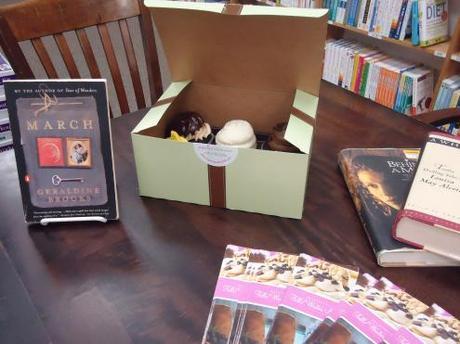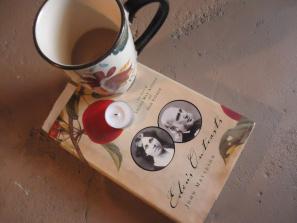 My post today is supposed to be an update of last night’s book club meeting at Half Price Books in Humble. We discussed Geraldine Brooks’ March, Alcott’s Little Women, Bronson Alcott, Fruitlands, and more. Gigi’s Cupcakes in The Woodlands donated a half dozen cupcakes (which are more like really rich mounds of awesomeness than your typical idea of a cupcake) and mid way through the discussion and a bit of double vanilla icing melting in my mouth, all my very southern self could think was “Oh My Heavenly Days.” The I-literally-feel-like-I-am-in-heaven version of that line, not the rolling of the eyes sarcastic version… you fellow southerners know the very huge difference.
My post today is supposed to be an update of last night’s book club meeting at Half Price Books in Humble. We discussed Geraldine Brooks’ March, Alcott’s Little Women, Bronson Alcott, Fruitlands, and more. Gigi’s Cupcakes in The Woodlands donated a half dozen cupcakes (which are more like really rich mounds of awesomeness than your typical idea of a cupcake) and mid way through the discussion and a bit of double vanilla icing melting in my mouth, all my very southern self could think was “Oh My Heavenly Days.” The I-literally-feel-like-I-am-in-heaven version of that line, not the rolling of the eyes sarcastic version… you fellow southerners know the very huge difference.
The discussion was awesome. I am quite enjoying this little once a month activity. I love how prepared my gentleman patron comes, with several books and research in tow. I love yacking aimlessly on end about our likes and dislikes and anything about the book that has moved us that much. Add in free cupcakes from GiGi’s and I feel as though we have created a true little slice of heaven tucked away in the corner of Half Price Books.
As far as the discussion of March was concerned, one thing that was agreed upon was the difficulty in reconciling the characters Brook created with the characters we all know and love from Little Women. How did such a hot-headed Marmee become such a controlled and beautifully calm version we read in Alcott’s original work? Things that Brooks clearly well researched don’t mesh with the feel we have for the same history growing up in the States. One thing that stuck out in our minds, as a group, is whether Marmee would have actually gone and stayed under the same roof with the character Grace. What do you think? It’s not too late to join the discussion, leave your thoughts in a comment or come to the meeting next month.
We also agreed on a memorable quote that made an appearance quite early in the novel:
“For to know a man’s library is, in some measure, to know his mind. And this mind was noble in its reach, wide in its interests, discerning in its tastes.” – pg. 18-19
Of course a group of bibliophiles would enjoy that one, of course.
 I am still reading Eden’s Outcasts, a book about Bronson Alcott and his daughter Louisa May. I believe I expressed this opinion last night, so I shall re-hash it here, and will probably say it again when I provide an official review of the biography… Bronson Alcott was a weird dude.
I am still reading Eden’s Outcasts, a book about Bronson Alcott and his daughter Louisa May. I believe I expressed this opinion last night, so I shall re-hash it here, and will probably say it again when I provide an official review of the biography… Bronson Alcott was a weird dude.
Louisa May Alcott’s father was a true transcendentalist, and with that come some shocking beliefs to someone raised as I was. To have your sole guide to life be your own conscious is rather difficult when your conscious moves you to establish a commune with other transcendentalists. Fruitlands became a commune of many differing beliefs and activities that never seemed to find a happy balance. You have one member running the place naked with another member refusing to farm, another with children, and others anti-children. The only common belief system to educate and be separate from the world. In Bronson Alcott’s attempt to create a heavenly utopia he created a hot mess, which upon seeing it I would exclaim in sarcasm now: Oh My Heavenly Days.
I am amazed that Louisa May Alcott came out mostly well adjusted. I am not, however, surprised that the story of Little Women in a happy little world to lose yourself. Little Women functions as a biography of the best versions of her family brought to life in fiction, all the strange and unhappy parts discarded probably for the sake of sanity.
That brings me back to Geraldine Brooks’ March. March is a much darker, sinister, true to life version of the tale of Little Women and Mr. and Mrs. March. It is a grown ups history. I think what is most difficult is reconciling the fictional tale of Little Women with the very real feeling war novel of March. There are some details here and there that ring false, but for the most part it is graphically realistic of some pieces of the Civil War. It captures the darker sides of human nature that Little Women does not address, things that coming from an abolitionist’s family Louisa might have been very familiar.
What do you think?
